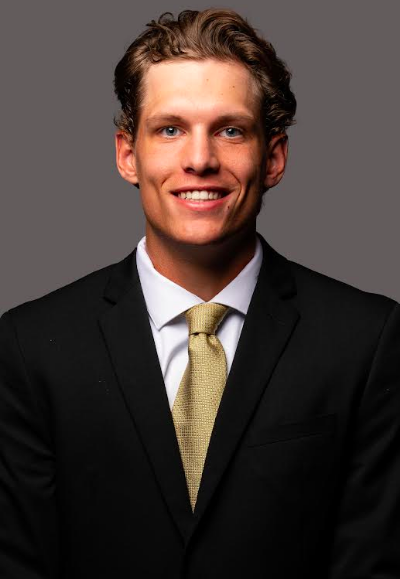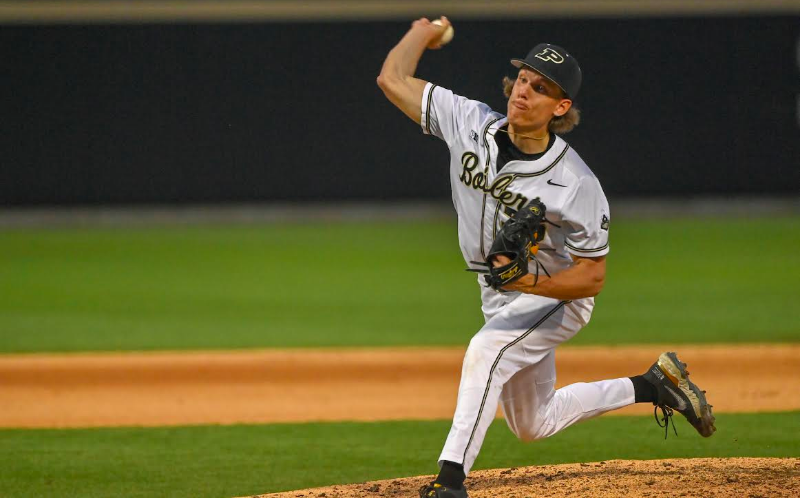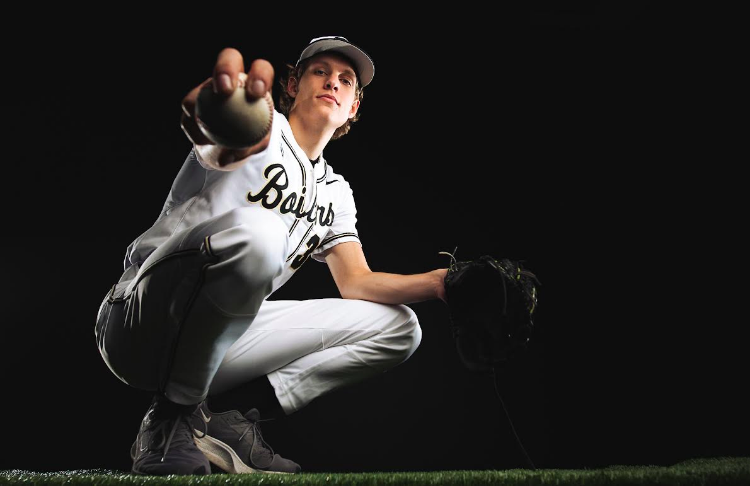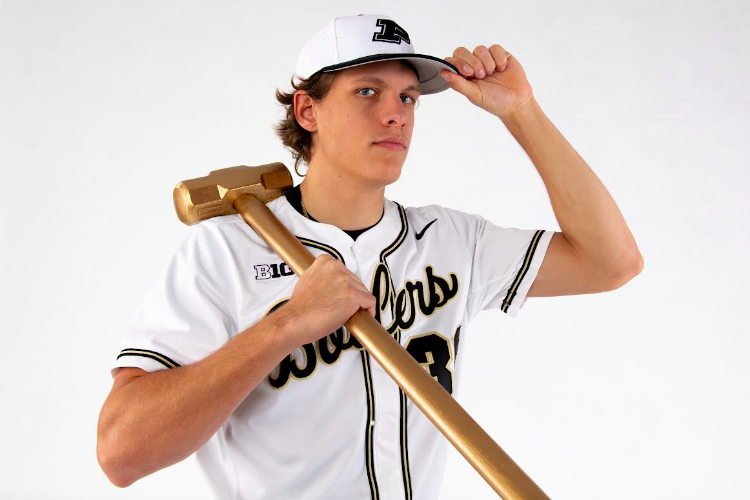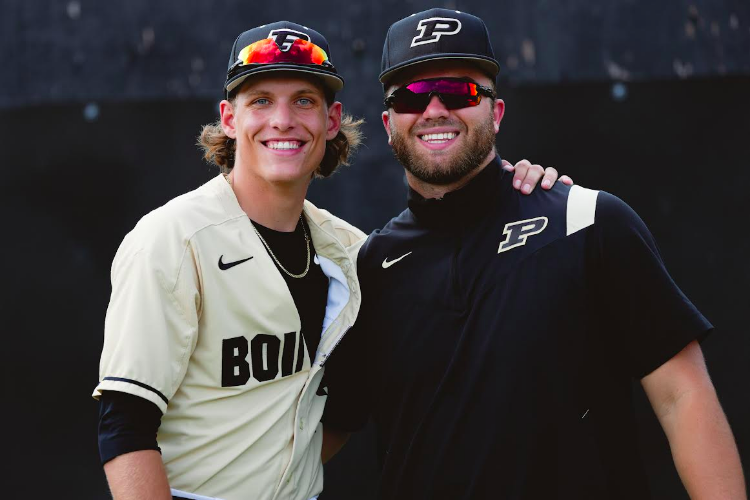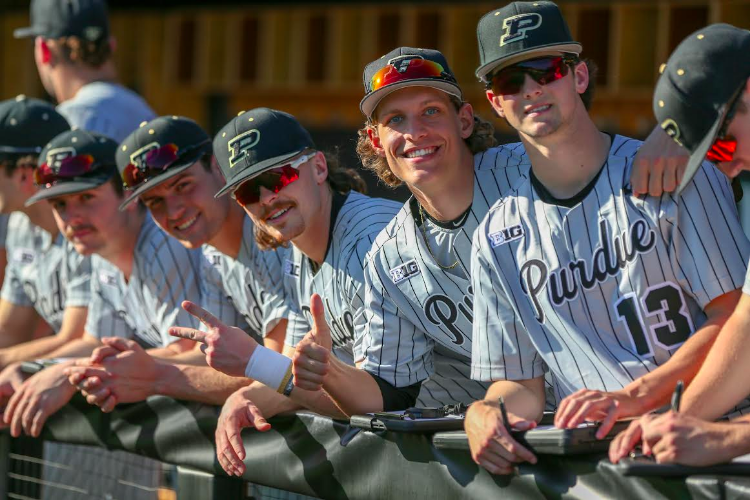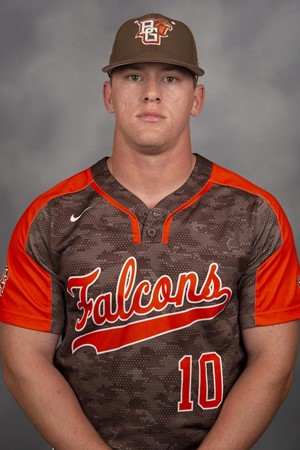
BY STEVE KRAH
http://www.IndianaRBI.com
Carter Doorn enjoyed a super season in his first summer since becoming a college baseball pitcher.
The right-hander saw limited action at Purdue University in the spring then turned heads with the 2022 Lima (Ohio) Locos of the Great Lakes Summer Collegiate League.
The 2021 graduate of Lake Central High School in St. John, Ind., made four mound appearances for the Boilermakers (all in relief) and went 0-0 with a 9.82 earned run average, five strikeouts and five walks over 3 2/3 innings.
Combining the regular season, a 1-2-3 frame in the July 12 GLSCL All-Star Game in Mason, Ohio, and the playoffs, Doorn pitched in 10 games (eight starts) representing the Locos and went 2-1 with a 1.13 ERA, 54 strikeouts and 23 walks over 48 innings.
During his award-taking summer, he was named the Lou Laslo Pitcher of the Year and Tony Lucadello Top Pitcher Prospect in the GLSCL’s North Division and was also chosen first-team all-league.
Doorn fanned 11 in six innings July 15 against the visiting Grand Lake Mariners (Celina, Ohio) and whiffed nine in six frames June 21 in a road game vs. the Muskegon (Mich.) Clippers.
In a one-inning stint in Game 3 of the league championship series July 31 against the Hamilton Joes, Doorn achieved a personal-best with a 96 mph four-seam fastball.
The 6-foot-3, 190-pounder landed in Lima thanks to a Purdue connection. Boilers volunteer assistant coach Daniel Furuto is a former Locos manager and is the brother of 2022 Lima manager Matt Furuto. Purdue infielder Ty Gill (Valparaiso High School Class of 2021) also played for the team this summer.
Doorn’s pitch selection has changed over time. With the Locos, he used the four-seamer (which sat 90 to 92 mph), sinker, slider, curveball and change-up. He went with the four-seamer, curve and slider in 3-2 counts.
When behind in the count, Doorn would often use his sinker (combination one- or two-seamer) that goes drops and gets on the hands of right-handed hitters.
His slider — thrown in the low 80s — is a mix of a cutter and traditional slider.
“It does not have much depth,” says Doorn, 19. “It moves a lot from right to left. It moves away from a right-hander.”
Throwing from a three-quarter arm slot, his curve drops almost 12-to-6 on the clock face. It goes away from a righty and into a lefty.
“My curveball is my best breaking pitch,” says Doorn.
A “circle” change-up moves into a right and away from a lefty.
Born in Chicago, Doorn grew up in Schererville, Ind. His 11U summer was his last at Dyer (Ind.) Little League and his first in travel ball with Morris Baseball. He played for some other travel teams in tournaments, but was primarily with Morris. He spent his 17U summer with the Dave Sutkowski-coached 5 Star Great Lakes Chiefs (formerly the Hammond/Morris Chiefs).
“Coach Bush is really, really wise,” says Doorn of Sutkowski. “When he says something you have to listen.”
Doorn, who committed to Purdue even before that summer leading into his senior year of high school, respects how Sutkowski takes a different group of 17-year-olds year after year and helps them find a college baseball home.
“He shows how much he cares for these kids’ development and the career they have ahead of them,” says Doorn.
Carter is the oldest of Karl and Carli Doorn’s two children. Carpenter/contractor Karl Doorn played baseball and football at Thornwood High School in South Holland, Ill., Veterans Administration nurse practitioner Carli Doorn played volleyball and basketball and Illiana Christian High School when it was located in Lansing, Ill. Indiana Wesleyan University-bound Mia Doorn (18) played four seasons of varsity volleyball at Illiana Christian, which is now located in Dyer.
Carter spent his first two prep years at Illiana Christian and his last two at Lake Central. His head baseball coaches were Darren DeBoer with the Vikings and Mike Swartzentruber with the Indians.
“He’s an awesome dude,” says Doorn of DeBoer. “He’s super, super caring for players and the program. Being athletic director and a coach shows his devotion.
“I never had a bad experience with him. He always knows what to say at the right time. He’s really good with words.”
Though the COVID-19 pandemic took away the 2020 season, Doorn did get to experience Swartzentruber.
“He’s one of the most competitive people I’ve ever met in my life,” says Doorn of Swartzentruber. “He always wants the best for whoever he associates himself with
“He’s a gritty coach and you can always ask him questions.”
In his one season for Lake Central (2021), Doorn was an all-Duneland Athletic Conference honoree, Indiana High School Baseball Coaches Association District A Player of the Year and an IHSBCA North/South All-Star Series selection.
The pitcher/corner infielder was also finalist for IHSBCA Player of the Year after posting strong pitching and hitting numbers. On the mound, he was 8-1 with a 1.21 ERA, 0.97 WHIP (walks and hits per innings pitched) and 94 strikeouts in 48 innings with a no-hitter. He struck out 12 and 14 in consecutive starts.
He also hit .406 with 47 runs batted in and a 1.212 OPS (.522 on-base percentage plus .690 slugging average) in 28 games.
Doorn spent the summer of 2021 living in central Indiana on weekdays training at PRP Baseball in Noblesville, Ind., and playing for the Greg Vogt-coached 18U Mambas on the weekend.
Deciding he wanted to throw a baseball harder, Doorn gave up basketball after his ninth grade year and hit the weights to put some muscle on what was then a 6-3, 135-pound frame.
His goal has been to develop year after year he got to work on becoming bigger, faster and stronger at PRP while continuing work with former Morris Chiefs coach Anthony Gomez.
Thinking he would pursue a path to become a dentist, Doorn entered Purdue as a Biology major. He has since changed to Construction Management Technology.
“I grew up on the construction scene on my dad’s job sites,” says Doorn for his decision to switch majors.
Doorn, who turns 20 on Aug. 24, plans to heads back to West Lafayette a week before that. A team meeting is planned for Aug. 21, followed by six weeks or so of individual work then full team practice.
With a number of graduations, transfers and pitchers being selected in the Major League Baseball First-Year Player Draft, Doorn expects Purdue pitching staff to look much different in 2023.
Gone are all three weekend starters — Jackson Smeltz (drafted in the 10th round by the San Diego Padres), Wyatt Wendell (signed as a free agent with the Arizona Diamondbacks) and Troy Wansing (transferred to Texas A&M).
